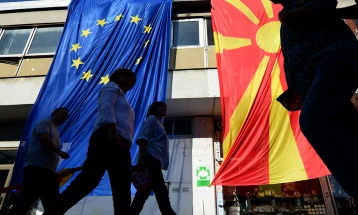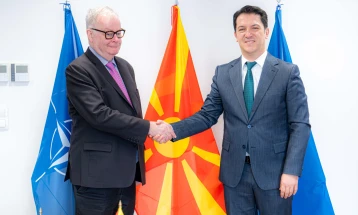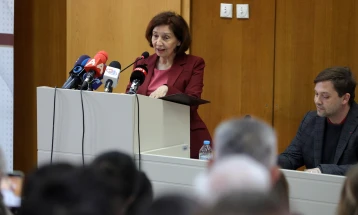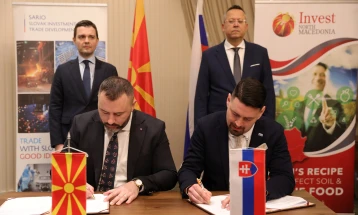MINISTERIAL MEETING OF THE INTERGOVERNMENTAL CONFERENCE- COMPLETING THE OPENING OF THE NEGOTIATIONS ON THE ACCESSION OF NORTH MACEDONIA TO THE EUROPEAN UNION
- Post By Ivan Kolekevski
- 14:21, 1 July, 2022

GENERAL EU POSITION
EU OPENING STATEMENT FOR ACCESSION NEGOTIATIONS
1. After the first political IGC hold on [date] and on behalf of the European Union, I am delighted to welcome here today the distinguished representatives of North Macedonia to finalise the phase of opening of accession negotiations of your country with the European Union.
2. In line with the Council conclusions of 25 March 2020, endorsed by the members of the European Council on 26 March 2020, the Council [approved in June 2022] a general Negotiating Framework, taking into account the aforementioned conclusions, as well as other relevant Council conclusions, the renewed consensus on enlargement, and established practice.
The Negotiating Framework, which we present to you today, takes account of the experience of past enlargements and on-going accession negotiations, as well as the evolving EU acquis, and duly reflects North Macedonia's own merits and specific characteristics. The negotiations are aimed at North Macedonia integrally adopting the EU acquis and ensuring its full implementation and enforcement. It incorporates the enhanced enlargement methodology, which provides for an even stronger focus on the fundamental reforms in the accession negotiations. North Macedonia will need therefore to fully embrace and implement reforms in the fundamental areas of rule of law, in particular judicial reform and the fight against corruption and organised crime, fundamental rights, the strengthening of democratic institutions and public administration reform, as well as economic criteria. Special attention should be given to the protection and non-discriminatory treatment of citizens belonging to minorities or communities. To ensure the irreversibility of progress in these areas and its full and effective implementation, progress will continue to be closely monitored by the Commission, which will report regularly on it to the Council.
Given the crucial importance throughout the process of the underlying reforms, progress on the fundamentals cluster will determine the overall pace of negotiations. This will allow sufficient time to establish the necessary legislation, institutions and solid track records of implementation before the negotiations are closed. Screening reports, to be prepared by the Commission, will provide substantial guidance, including on the tasks to be addressed in the roadmaps to be adopted by the authorities of North Macedonia.
3. The EU acquis includes, inter alia, the objectives and principles on which the Union is founded, as set out in the Treaty on European Union. As a future Member State, we expect you to adhere to the values, listed in Article 2 in the Treaty on European Union, namely the respect for human dignity, freedom, democracy, equality, the rule of law and respect for human rights, including the rights of persons belonging to minorities. Furthermore, EU accession implies the timely and effective implementation of the entire body of EU law or EU acquis, as it stands at the time of accession. Under the enhanced enlargement methodology, the development of sufficient administrative and judicial capacity, as part of the fundamentals’ cluster, is key in fulfilling all obligations stemming from membership. Regarding the translations of the acquis into Macedonian, the EU took note of Bulgaria and North Macedonia’s respective unilateral declarations on the Macedonian language.
4. Regional cooperation and good neighbourly relations remain essential elements of the enlargement process. North Macedonia should continue to constructively engage in inclusive regional cooperation and strengthen relations with neighbouring countries. Today, we recall the importance of achieving tangible results and implement, in good faith bilateral agreements, including the Prespa Agreement with Greece and the Treaty on Good Neighbourly Relations with Bulgaria.
5. In the period up to accession, North Macedonia will be required to progressively align its policies towards third countries and its positions within international organisations with the policies and positions adopted by the Union and its Member States.
6. Let us also recall that parallel to the accession negotiations, the Union and North Macedonia will continue their civil society dialogue and cultural cooperation, with the aim of bringing people closer together and ensuring the support of citizens for the accession process. We expect North Macedonia to accurately and strategically communicate the benefits and obligations of the accession process to its public, including addressing disinformation, in accordance with its pro-European strategic choice.
7. It will remain up to the Member States to decide whether conditions are right for the conclusion of the negotiations, bearing in mind developments in the EU acquis since the date of the opening of negotiations, and North Macedonia's readiness for membership.
8. The accession negotiations, whose opening we complete today, will be rigorous and demanding. With determination and commitment, we are confident in your capacity to bring it to a successful conclusion. We will support you in your efforts and we look forward to welcoming you as a fully-fledged member of the European Union.
NEGOTIATING FRAMEWORK
Principles governing the negotiations
1. The accession negotiations will be based on Article 49 of the Treaty on European Union (TEU) and, accordingly, take into account all relevant European Council conclusions, as well as the Joint Statement of the Members of the European Council of March 2020 endorsing the enhanced enlargement methodology1, the renewed consensus on enlargement agreed by the December 2006 European Council and the conclusions of the 1993 European Council in Copenhagen.
The enhanced enlargement methodology aims to reinvigorate the accession process by making it more predictable, more credible, more dynamic and subject to stronger political steering, based on objective criteria and rigorous positive and negative conditionality, and reversibility.
2. The negotiations will be based on North Macedonia’s own merits and the pace will depend on North Macedonia’s progress in meeting the requirements for membership. The Commission or, as appropriate the Presidency, will keep the Council regularly informed in this respect so that the Council can keep the situation under constant review. The Union side, for its part, will decide in due course whether the conditions for the conclusion of negotiations have been met; this will be done on the basis of a report from the Commission confirming the fulfilment by North Macedonia of the requirements listed in point 5. The shared objective of the negotiations is accession. By their very nature, the negotiations are an open-ended process whose outcome cannot be guaranteed beforehand.
In the field of the EU’s common foreign and security policy (CFSP), the High Representative of the Union for Foreign Affairs and Security Policy is responsible, in close liaison with the Member States, and the Commission where appropriate, for screening, making proposals in the negotiations and reporting regularly to the Council.
3. Enlargement should strengthen the process of continuous integration in which the Union and its Member States are engaged. Every effort should be made to protect the cohesion and effectiveness of the Union. In accordance with the conclusions of the European Council in December 2006, stressing the importance that the EU can maintain and deepen its own development, the pace of enlargement must take into account the Union's capacity to absorb new members, which is an important consideration in the general interest of both the Union and North Macedonia.
4. Negotiations are opened on the basis that North Macedonia respects and is committed to promoting the values on which the Union is founded, referred to in Article 2 TEU, namely the respect for human dignity, freedom, democracy, equality, the rule of law and respect for human rights, including the rights of persons belonging to minorities.
Negotiations are also opened on the basis that North Macedonia has achieved a high degree of compliance with the membership criteria, notably the political criteria set by the Copenhagen European Council in 1993 and the Stabilisation and Association Process conditionality established by the Council in 1997. The Union expects North Macedonia to work towards full respect of these criteria and conditions, to show steadfast political commitment and to ensure full implementation of key reforms and legislation, notably in the fundamental areas of rule of law, in particular judicial reform and the fight against corruption and organised crime, fundamental rights, including anti-discrimination and fight against hate speech, the strengthening of democratic institutions and public administration reform, as well as economic criteria.
5. The advancement of the negotiations will be guided by North Macedonia’s progress in preparing for accession and foster economic and social convergence. This progress will be measured in particular against the following requirements:
– The Copenhagen criteria, which set down the following requirements for membership:
• the stability of institutions guaranteeing democracy, the rule of law, human rights and respect for and protection of minorities;
• the existence of a functioning market economy and the capacity to cope with competitive pressure and market forces within the Union;
• the ability to take on the obligations of membership, including adherence to the aims of political, economic and monetary union and the administrative capacity to effectively apply and implement the acquis.
– The Stabilisation and Association Process, which remains the common framework for relations with the Western Balkans up to their accession.
– The fulfilment of North Macedonia’s obligations under the Stabilisation and Association Agreement as well as North Macedonia’s progress in addressing the key areas identified in the Commission’s reports and the relevant Council conclusions.
– In view of the above, North Macedonia’s commitment to good neighbourly relations and closer regional cooperation, including through achieving tangible results and implementing in good faith bilateral agreements, including the Prespa Agreement with Greece and the Treaty on Good Neighbourly Relations with Bulgaria of 2017 as well as the annual reviews and measures for its effective implementation under its Article 12, in accordance with the Thessaloniki Agenda for the Western Balkans adopted in June 2003, the Sofia Declaration of May 2018 the Zagreb Declaration of May 2020 and the Brdo Declaration of October 2021, the Council conclusions on enlargement and stabilisation and association process from March 2020 and December 2021 and other relevant Council conclusions.
6. In the period up to accession, North Macedonia will be required to progressively align its policies towards third countries and its positions within international organisations with the policies and positions adopted by the Union and its Member States. CFSP alignment will be regularly monitored throughout the negotiation process and promoted through regular CFSP dialogue.
7. The substance of negotiations will be conducted in an Intergovernmental Conference with the participation of all Member States on the one hand and North Macedonia on the other. The Intergovernmental conference will take place at least once a year, after the adoption of the Council conclusions taking into account the Commission's annual enlargement package, and whenever relevant. The Intergovernmental conference will provide political steer and a forum for political dialogue on the reform process. It will also take stock of the overall accession process and set out an indication for the year ahead of what clusters / chapters could potentially be opened or closed and possible corrective measures based on the state of implementation of reforms. All sides will ensure representation in the Intergovernmental conference at the appropriate level. The procedure for and organisation of the negotiations is set out in Annex I.
The Commission will systematically consult Member States throughout the accession process. Member States may contribute via monitoring on the ground through their experts, direct contributions to the annual enlargement package and sectoral expertise.
8. In order to inject dynamism into the negotiating process and to foster cross-fertilisation of efforts beyond individual chapters, the negotiating chapters will be organised in thematic clusters. These clusters bring together the chapters / areas according to broader themes (see Annex II) and will allow a stronger focus on core sectors.
9. The enhanced enlargement methodology provides for an even stronger focus on reforms in the fundamental areas of the accession process as listed in paragraph 4, which North Macedonia must fully embrace and implement. North Macedonia must ensure that its institutions, management capacity and administrative and judicial systems are sufficiently strengthened with a view to implementing the acquis effectively.
10. Given the crucial importance throughout the process of the underlying reforms, negotiations on the fundamentals’ cluster will be opened first and closed last. This will allow sufficient time to establish the necessary legislation, institutions, and solid track records of implementation before the negotiations are closed. Progress under the fundamentals' cluster will determine the overall pace of negotiations, and will be taken into account for the decision to open or close new clusters or chapters.
11. If North Macedonia makes sufficient progress on reform priorities agreed in the negotiations, this should lead to:
1/ closer integration with the European Union, through accelerated integration and “phasing in” to individual EU policies, the EU market and EU programmes in order to unleash the potential of such integration, in particular by removing technical barriers to trade, while ensuring a level playing field; primary focus should be given to areas where the candidate country already has the capacity and expertise for exports to the EU, and on areas of mutual strategic interest where the candidate country has significant production but needs to meet EU norms and standards (e.g. production of critical raw materials), and as well on areas where there is a vast untapped potential (e.g. digital/ green economy).
2/ increaed investments and funding, including intensifying the pre-accession assistance in line with applicable legal provisions, rules and procedures and a closer cooperation with relevant International Financial Institutions to leverage investments and support; the use of EU funding should create a strong European preference and a strong local economy by projects being implemented, to the extent possible, by EU and local businesses, in full compliance with the EU acquis, including the legal framework of the respective financial instruments, and the international commitments of the EU.
12. The predictability of the accession process requires decisive and proportionate corrective measures in cases of any serious or prolonged stagnation or backsliding in reform implementation and meeting the requirements of the accession process.
In the specific cases listed below requiring a quick response to the situation and/or reversibility of the process simplified procedures will be used, including reverse qualified majority voting by the Council.
13. In the case of a serious and persistent breach by North Macedonia of the values on which the Union is founded, the Commission can, on its own initiative or at the duly motivated request of a Member State, recommend the suspension of negotiations and propose the conditions for eventual resumption.
The decision to suspend the negotiations shall be deemed to be adopted by the Council, unless, after having heard North Macedonia, it decides by a qualified majority to reject the Commission's recommendation within 90 days. The European Parliament will be informed.
Once the Commission assesses that the conditions for eventual resumption are met by North Macedonia, it will recommend to the Council to resume the accession negotiations. The decision thereon shall be deemed to be adopted by the Council, unless it decides by a qualified majority to reject the Commission's recommendation within 90 days.
14. In case of
i) any serious or prolonged stagnation or backsliding in reform implementation in the fundamentals’ cluster, or
ii) a situation where progress under the fundamentals’ cluster significantly lags behind progress in other areas and this leads to an overall imbalance of the enlargement negotiations, and after having exhausted all other available measures, the Commission can on its own initiative or at the duly motivated request of a Member State propose to withhold its recommendations to open and/or close other negotiating clusters and chapters, and adapt the associated preparatory work, as appropriate, until this stagnation, backsliding or imbalance is addressed.
The decision thereon, shall be deemed to be adopted by the Council, unless, after having heard North Macedonia, it decides by a qualified majority to reject the Commission's proposal within 90 days. The Member States will act in the Intergovernmental Conference in accordance with this Council decision.
Once the Commission assesses that the stagnation, backsliding or imbalance is addressed, it will recommend to the Council to open and/or close the negotiating clusters and chapters concerned. The decision thereon shall be deemed to be adopted by the Council, unless it decides by a qualified majority to reject the Commission's recommendation within 90 days.
15. In the case of provisionally closed chapters, the Commission can on its own initiative or at the duly motivated request of a Member State recommend the re-opening of negotiations on the chapter - and the cluster of which it is a part if the cluster had also been provisionally closed where North Macedonia has failed to continue meeting important benchmarks or to implement its commitments.
The decision to re-open negotiations on provisionally closed chapters shall be deemed to be adopted by the Council, unless, after having heard North Macedonia, it decides by a qualified majority to reject the Commission's recommendation within 90 days. The Member States will act in the Intergovernmental Conference in accordance with this Council decision.
Once the Commission assesses that the chapter and the cluster, which was re-opened can be closed, it will recommend to the Council to close this chapter and the cluster. The decision thereon shall be deemed to be adopted by the Council, unless it decides by a qualified majority to reject the Commission's recommendation within 90 days.
16. Where there is significant backsliding in a cluster or under a specific chapter that has not yet been provisionally closed, the Commission can on its own initiative or at the duly motivated request of a Member State recommend that the previous opening of the cluster concerned be reversed.
The decision to reverse the previous opening of a cluster shall be deemed to be adopted by the Council, unless, after having heard North Macedonia, it decides by a qualified majority to reject the Commission's recommendation within 90 days. The Member States will act in the Intergovernmental Conference in accordance with this Council decision.
Once the Commission assesses that the cluster can be opened again, it will recommend to the Council to open this cluster. The decision thereon shall be deemed to be adopted by the Council, unless it decides by a qualified majority to reject the Commission's recommendation within 90 days.
17. The scope and intensity of pre-accession assistance may also be adjusted downward, with the exception of support to civil society, in accordance with applicable rules and procedures.
18. In order to strengthen public confidence in the enlargement process, decisions will be taken as openly as possible so as to ensure greater transparency. EU Common Positions will be made public upon adoption. It is expected of North Macedonia to conduct its own preparations in full transparency with appropriate stakeholder involvement and through an inclusive and meaningful dialogue with citizens and civil society. Internal consultations and deliberations will be protected to the extent necessary in order to safeguard the decision making process, in accordance with EU legislation on public access to documents in all areas of Union activities.
19. North Macedonia must accept the results of any other accession negotiations as they stand at the moment of its accession. Clear commitments will be needed to ensure that no future Member State is in a position to unduly block the accession of other Western Balkan candidates, provided they meet the Union’s accession criteria.
20. Parallel to the accession negotiations, the Union and North Macedonia will continue and further enhance their civil society dialogue and cultural cooperation, with the aim of bringing people together and ensuring the support of citizens for the accession process.
21. North Macedonia should accurately and strategically communicate the benefits and obligations of the accession process to its public, including addressing disinformation, in accordance with its pro-European strategic choice.
Substance of the negotiations
22. Accession implies the acceptance of the rights and obligations attached to the Union and its institutional framework, known as the “acquis” of the Union. North Macedonia will have to apply this as it stands at the time of accession. In addition to legislative alignment, accession implies, in particular the timely and effective implementation of the acquis. The acquis is constantly evolving and includes in particular:
– the content, principles, values and political objectives of the Treaties on which the Union is founded;
– the acts adopted by the institutions pursuant to the Treaties, as well as the case law of the Court of Justice of the European Union;
– any other acts, legally binding or not, adopted within the Union framework, such as inter-institutional agreements, resolutions, statements, recommendations, guidelines;
– international agreements concluded by the Union, by the Union jointly with its Member States, and those concluded by the Member States among themselves with regard to Union activities.
This applies mutatis mutandis to the Treaty establishing the European Atomic Energy Community (Euratom) and any acts adopted and agreements concluded pursuant or within the framework of that treaty, to which North Macedonia shall also adhere.
North Macedonia will need to produce translations of the acquis into Macedonian in good time before accession, and will need to train a sufficient number of translators and interpreters required for the proper functioning of the EU institutions upon its accession.
23. The resulting rights and obligations, all of which North Macedonia will have to honour as a Member State, imply the termination of all existing bilateral agreements between North Macedonia and the Union, and of all other international agreements concluded by North Macedonia which are incompatible with the obligations of membership.
24. North Macedonia’s acceptance of the rights and obligations arising from the acquis may necessitate specific adaptations to the acquis and may, exceptionally, give rise to transitional measures, which must be defined during the accession negotiations. Any provisions of the Stabilisation and Association Agreement which depart from the acquis cannot be considered as precedents in the accession negotiations.
25. Where necessary, specific adaptations to the acquis will be agreed on the basis of the principles, criteria and parameters inherent in that acquis as applied by the Member States when adopting that acquis, and taking into consideration the specificities of North Macedonia.
26. The Union may agree to requests from North Macedonia for transitional measures provided they are limited in time and scope, and accompanied by a plan with clearly defined stages for application of the acquis. For areas linked to the extension of the internal market, regulatory measures should be implemented quickly and transition periods should be short and few; where considerable adaptations are necessary requiring substantial effort including large financial outlays, appropriate transitional arrangements can be envisaged as part of an ongoing, detailed and budgeted plan for alignment. In any case, transitional arrangements must not involve amendments to the rules or policies of the Union, disrupt their proper functioning, or lead to significant distortions of competition. In this connection, account must be taken of the interests of the Union and of North Macedonia. Transitional measures and specific arrangements, in particular safeguard clauses, may also be agreed in the interest of the Union, in line with the second bullet point of paragraph 23 of the European Council conclusions of 16/17 December 2004.
27. Detailed technical adaptations to the acquis will not need to be fixed during the accession negotiations. They will be prepared in cooperation with North Macedonia and adopted by the Union institutions in good time with a view to their entry into force on the date of accession.
28. North Macedonia will participate in economic and monetary union from accession as a Member State with a derogation and shall adopt the euro as its national currency following a Council decision to this effect on the basis of an evaluation of its fulfilment of the necessary conditions. The remaining acquis in this area fully applies from accession.
29. With regard to the area of justice, freedom and security, membership of the European Union implies that North Macedonia accepts in full on accession the entire acquis in this area, including the Schengen acquis. However, part of this acquis will only apply in North Macedonia following a Council decision to lift controls on persons at internal borders taken on the basis of the applicable Schengen evaluation of North Macedonia’s readiness, taking into account a Commission report confirming that North Macedonia continues to fulfil the commitments undertaken in the accession negotiations that are relevant for the Schengen acquis.
Negotiating procedures
30. The Commission will undertake a formal process of screening the acquis, in order to inform the authorities of North Macedonia of acquis developments, to assess the state of preparation of North Macedonia for opening negotiations in specific areas and to obtain preliminary indications of the issues that will most likely come up in the negotiations. The screening process should also serve to identify areas for accelerated integration, to be agreed between the EU and North Macedonia for follow-up in the Stabilisation and Association Agreement bodies where appropriate. During the screening exercise, the Commission will also identify key anti-corruption reform priorities and assess the relevant administrative capacity.
31. For the purposes of screening and the subsequent negotiations, the acquis will be broken down into a number of chapters, each covering a specific policy area; the chapters will be grouped into six thematic clusters. A list of these chapters and clusters is provided in Annex II. Any view expressed by either North Macedonia or the EU on a specific chapter or cluster of the negotiations will in no way prejudge the position which may be taken on other chapters or clusters. Policy areas in which particularly serious efforts are required by North Macedonia to align legislation with the acquis and to ensure its implementation and enforcement will be addressed at an early stage in the accession negotiations. Also, agreements reached in the course of negotiations on specific chapters or clusters, even partial ones, may not be considered as final until an overall agreement has been reached for all clusters.
32. The screening process will be carried out by clusters, and will result in proposed opening benchmarks identifying key reforms for the cluster as a whole, where appropriate. The screening process will also, where appropriate, identify proposed areas for accelerated integration together with the conditions to be fulfilled by North Macedonia to ensure the highest compliance with the acquis in the relevant area. On this basis, the Council, acting by unanimity on a proposal of the Commission, will lay down and assess the opening benchmarks for the cluster as well as agree on the areas for accelerated integration in line with applicable rules and procedures.
33. In accordance with paragraph 10, given the crucial importance of the reforms in the fundamentals' areas, negotiations on the fundamentals’ cluster will be opened first and closed last and will be subject to the specific procedure set out below, while other clusters may be opened as well as be closed simultaneously.
34. As regards the fundamentals' cluster, the Commission, on the basis of the screening report, will propose that a roadmap for the rule of law chapters as well as a roadmap for public administration reform, to be prepared by the authorities of North Macedonia, serve as opening benchmarks. Additional opening benchmarks can be set in the chapters on public procurement and financial control, as necessary. The Council acting by unanimity on the proposal by the Commission will lay down and assess these opening benchmarks.
35. North Macedonia will be therefore invited to prepare a roadmap for the rule of law chapters (23 - Judiciary and fundamental rights and 24 - Justice, Freedom and Security). This roadmap will be adopted by the authorities of North Macedonia on the basis of guidance to be provided in the screening reports by the Commission and after a transparent process of meaningful consultation with all relevant stakeholders, including civil society. The roadmap should contain key reform priorities and guide the accession negotiations in these chapters and preparations for meeting the requirements for membership. North Macedonia will adopt through an inclusive process an Action Plan dedicated to the protection of the rights of persons belonging to minorities or communities, including, inter alia, in the field of non-discrimination, fight against hate speech, education, setting up effective measures, reporting mechanisms and identifying respective responsible institutions. Implementation of this roadmap and Action Plan will be constantly monitored and regularly addressed at the Intergovernmental conferences throughout the process.
36. North Macedonia will also be invited to prepare and adopt а roadmap for the functioning of democratic institutions as well as a roadmap for public administration reform, on which the Commission will provide guidance in the screening reports. These roadmaps will be developed through a transparent process of meaningful consultation with all relevant stakeholders, including civil society. They will set out the general commitments of the country for reforms in the respective areas with a clear timetable and the key steps envisaged. Implementation of these roadmaps will be constantly monitored and regularly addressed at the Intergovernmental conferences throughout the process.
37. Once the Council is satisfied, on the basis of an assessment by the Commission, that the opening benchmarks for the fundamentals cluster have been met, the Council will decide on the opening of the fundamentals’ cluster and, acting by unanimity, lay down interim benchmarks on the rule of law chapters in the EU opening position based on a Commission proposal. These interim benchmarks will specifically target, as appropriate, the adoption of legislation and the establishment and strengthening of administrative structures and of an intermediate track record and will be closely linked to actions and milestones in the implementation of the roadmap and Action Plan. No chapter will be provisionally closed before these interim benchmarks are met.
38. Once the Council is satisfied that these interim benchmarks have been met, the Council will, acting by unanimity, lay down in an interim position the closing benchmarks for







